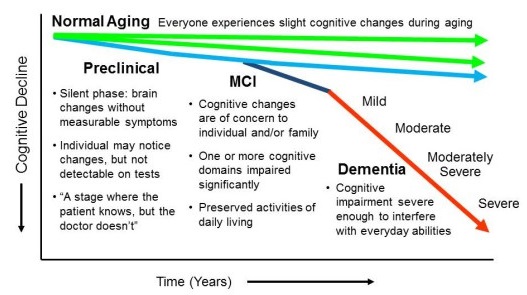Mild Cognitive Impairment
Our brain, like the rest of our body, changes as we grow older. Many people notice gradually increasing forgetfulness as they age. It may take longer to think of a word or to recall a person's name. Mild cognitive impairment (MCI) is a condition in which memory problems and/or other cognitive difficulties (e.g., language, visual-spatial skills) are noticeable to the person affected and/or others (e.g., family, friends, work colleagues), but are not severe enough to interfere with basic living skills.
MCI is considered an intermediate stage between the expected cognitive decline of normal aging and the more-serious decline of dementia. It can involve problems with memory, language, thinking and judgment that are greater than normal age-related changes.
If you have mild cognitive impairment, you may be aware that your memory or mental function has "slipped." Your family and close friends also may notice a change. But generally these changes aren't severe enough to significantly interfere with your day-to-day life and usual activities.
The typical transition from normal aging to Alzheimer’s disease is very subtle with signs and symptoms emerging very gradually. Everyone can expect to experience cognitive changes as they age. Common changes associated with normal aging include slower recall of information such as names, increased effort to learn and store new information, greater susceptibility to distraction, slower processing of new information, and greater difficulty multi-tasking.

Progression from normal aging to Alzheimer’s disease or another dementia
An individual with MCI will score significantly lower than others of the same age on neuropsychological measures of the affected cognitive domains (e.g., memory, language).
Some studies suggest that up to 10-20% of older adults age 65 and older have MCI. There is no single cause of MCI, just as there is no single outcome for the disorder. Symptoms of MCI may remain stable for years, progress to Alzheimer's disease or another type of dementia, or improve over time.
Over time, most individuals diagnosed with MCI do progress (or “convert”) to AD. Overall, studies estimate that 10-15% of people with MCI progress to AD each year.
However, for unknown reasons, some people with MCI remain stable and some even improve. Brain imaging and biomarker studies of people with MCI may help researchers detect early brain changes, like those seen in AD, and assist in determining prognosis for patients with MCI.
Types of MCI
A doctor may diagnose an affected individual with one of the following MCI subtypes:
- Amnestic vs. Non-Amnestic MCI: In amnestic MCI, memory is significantly impaired. Other cognitive functions are spared. In non-amnestic MCI, memory remains intact, but one (single domain) or more (multiple domain) other cognitive abilities (e.g., language, visual-spatial skills, executive functioning) are significantly impaired.
- Single Domain vs. Multiple Domain MCI: In single domain MCI, only memory or one other domain of cognition is impaired. In multiple domain MCI, memory plus one or more other cognitive abilities are affected.
Individuals with amnestic MCI, single or multiple domain, may be at increased risk for Alzheimer’s dementia. Individuals with non-amnestic MCI may be at increased risk for other dementias, such as fronto-temporal dementia, or dementia with Lewy bodies. Having multiple domain MCI appears to increase the risk of future dementia.
Today, we are unable to definitively predict if a patient with MCI will progress to Alzheimer’s disease. Numerous studies are underway to identify those neuropsychological, neuropsychiatric, imaging and other features of MCI that might indicate risk for further decline.
